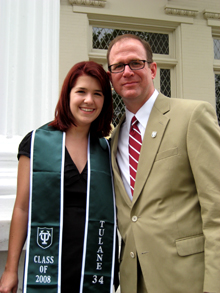Public Health School Celebrates Milestone
Since Hurricane Katrina, Tulane's recovery is punctuated by a series of milestones. At this year's commencement, yet another will be celebrated the graduation of the inaugural class earning bachelor of science in public health degrees from the School of Public Health and Tropical Medicine.

Amy Collins of Cut Off, La., one of seven in the inaugural class of bachelor of science in public health degree candidates at Tulane, and Jeffery Johnson, associate dean who serves as director of undergraduate public health studies, share a proud moment at the Tulane 34 Awards Ceremony on Tuesday (May 13). (Photo by Karen Collins)
Seven students will receive the degree, which was approved in 2003 and implemented in 2005 as a response to a growing health workforce crisis.
“Our school has continued to expand educational offerings, and this first graduating class in public health is evidence of Tulane's commitment to addressing this shortage,” says Pierre Buekens, dean of the School of Public Health and Tropical Medicine.
According to the Association of Schools of Public Health, the crisis is a culmination of forecasted shortages of public health professionals, as well as other contributing factors such as an expected spike in retirement. It is estimated that in Louisiana alone there will be a 67 percent shortage in the public health workforce by 2020.
“We're faced today with soaring healthcare costs and a system in crisis,” says Buekens. “Providing an undergraduate public health education will provide our communities with more leaders sensitive to the impact that health issues have on other social and political conditions.”
With that sense of urgency as the impetus for the program, the first students enrolled were known as “the Katrina class,” as they were set to begin their studies in fall 2005, when the hurricane hit. When Tulane reopened in spring semester 2006, the decision was made to allow sophomores to transfer in. The seven 2008 graduates entered the program via that decision.
“I was interested in public health graduate school,” says graduating public health senior Amy Collins. “When I came back from the Katrina semester and found out they were offering the undergrad degree to sophomores, I was really excited.”
Collins' excitement is shared by the administration.
“I feel the BSPH is such an opportunity for the university and the field of public health,” says Jeffery Johnson, associate dean who serves as director of undergraduate public health studies for the School of Public Health and Tropical Medicine. “The school already has a niche because we are the oldest public health school in the nation, and the only one with a tropical medicine component.”
Johnson's enthusiasm extends beyond the curriculum to the students, and the class of '08 is no exception.
“They are an amazing group of students,” Johnson says. “The undergraduate public health degree is a natural fit for young men and women who want to make a difference in the lives of others, both here in New Orleans and across the globe. The BSPH degree is also very well aligned with Tulane's renewed commitment to public service post-Katrina.”
Collins' personal feelings mirror Johnson's sentiments.
“Katrina really rooted me in public service and made me realize its importance, both to me and the community. A lot of the students' projects are focused on the New Orleans area. I think public health students are making an impact,” says Collins, who is from Cut Off, La. She plans to join Teach for America in Jacksonville, Fla., after graduation, and then hopes to pursue a combined MD/MPH degree.
According to Collins, Johnson's excitement is the rule rather than the exception among the school's faculty and administration.
“The excitement about public health is due to the people that are involved in the program. I really felt like we had a family in the school. They are so excited about [the subject] and that kind of enthusiasm is infectious.”
